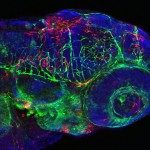Link to Pubmed [PMID] – 17889831
Biochem. Biophys. Res. Commun. 2007 Nov;363(3):536-41
How is one to investigate autophagic or necrotic cell death in the absence of interference from the apoptosis machinery? In the protist Dictyostelium, a model for the study of these two cell death types, we previously showed that autophagic cell death does not require paracaspase, the only caspase family member in this organism. In this report, we prepared two distinct paracaspase- atg1- double mutants, and we used them to demonstrate that paracaspase is not required for necrotic cell death either. Also, in silico investigation showed that the genome of Dictyostelium harbored no detectable member of the bcl-2 family and no single BH3 domain-bearing molecules. Altogether, in this model system both autophagic and necrotic cell death could occur, and could be investigated, with no interference from the two main molecular families involved in apoptosis, the caspase and the bcl-2 families.

